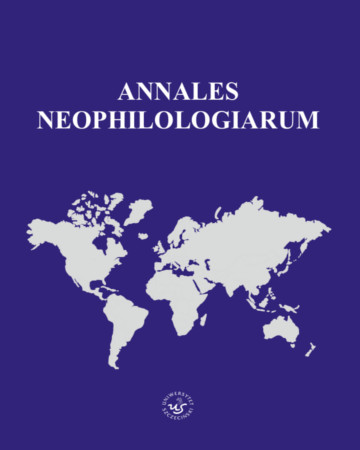




| Authors: |
Joanna
Witkowska
Wydział Filologiczny Uniwersytetu Szczecińskiego |
| Keywords: | World War II Polish-British cultural relations intercultural communication recollections |
| Data publikacji całości: | 2016 |
| Page range: | 20 (173-192) |
| 1. | Barker, Chris, Dariusz Galasiński. Cultural Studies and Discourse Analysis: A Dialogue on Language and Identity. London, Thousand Oaks, New Delhi: Sage Publications, 2003. |
| 2. | Battistella, Edwin. Bad Language: Are Some Words Better Than Others? Oxford, New York: Oxford University Press, 2005. |
| 3. | “Bloody Foreigners”: The Untold Battle of Britain. Written and directed by Carl Hindmarch. |
| 4. | Darlow Smithson Productions for Channel 4, first broadcast 29 June 2010. |
| 5. | Buchwald, Bernard Karol. Od Wrony do Spitfire’a. Wspomnienia pilota. Poznań: „Comp-Druk”, 1999. |
| 6. | Cieśla, Michał. Dzieje języków obcych w zarysie. Warszawa: Państwowe Wydawnictwo Naukowe, 1974. |
| 7. | Cook, Tim. “Fighting Words: Canadian Soldiers’ Slang and Swearing in the Great War”. Accessed 02.04.2016. http://www.historyextra.com/warslang. |
| 8. | Czerny, Zygmunt. „Ustrój nauczania języków obcych w polskiej szkole średniej”. In: Z problematyki nauczania języków obcych. Wybór artykułów z księgi pamiątkowej i zjazdu neofilologów (1929) i z „Neofilologa” (1930–1939), ed. Antoni Prejbisz, 212-226. Warszawa: Państwowe Zakłady Wydawnictw Szkolnych, 1962. |
| 9. | Domański, Ludwik B. My Flights to Freedom. Wrocław: Wydawnictwo Biuro Tłumaczeń, 2002. |
| 10. | Eco, Umberto. A Theory of Semiotcs. Bloomington: Indiana University Press, 1979. |
| 11. | Encyklopedia PWN. Accessed 25.05.2016. http://encyklopedia.pwn.pl/. |
| 12. | Finch, Geoffrey. How to Study Linguistics: A Guide to Understanding Language. |
| 13. | Houndmills, Basingstoke, Hampshire, New York: Palgrave Macmillan, 2nd ed., 2003. |
| 14. | Graeme, Turner. British Cultural Studies: An Introduction. London: Routledge, 2003. |
| 15. | Grzegorczykowa, Renata. Zarys słowotwórstwa polskiego. Słowotwórstwo opisowe. Warszawa: Państwowe Wydawnictwa Naukowe, 3rd ed. revised, 1979. |
| 16. | Gudykunst, William B. “An Anxiety/Uncertainty Management (AUM) Theory of Strangers’ |
| 17. | Intercultural Adjustment”. In: Theorising about Intercultural Communication, ed. William B. Gudykunst, 419-458. London, New Delhi: Sage Publications Thousand Oaks, 2005. |
| 18. | Gudykunst, William B. Ed. Theorising about Intercultural Communication. London, New Delhi: Sage Publications Thousand Oaks, 2005. |
| 19. | Harper, Douglas. Online Etymology Dictionary. Accessed 25.05.2016. http://www.etymonline.com/index.php?term=Liverpool. |
| 20. | Hofstede, Geert, Gert Jan Hofstede, Michael Minko. Cultures and Organisations: Software of the Mind. Intercultural Cooperation and Its Importance for Survival. New York: McGraw-Hill, 3rd ed., 2010. |
| 21. | Karnicki, Borys. Marynarski worek wspomnień. Warszawa: Wydawnictwo Ministerstwa Obrony Narodowej, 1987. |
| 22. | Karski, Jan. The Great Powers and Poland. From Versailles to Yalta. Lanham, Boulder, New York, Toronto, Plymouth, UK: Rowman & Littlefield, 2014. |
| 23. | Kim, Young Yun. “Adapting to a New Culture: An Integrative Communication Theory”. In: |
| 24. | Theorising about Intercultural Communication, ed. William B. Gudykunst, 375-400. London, New Delhi: Sage Publications Thousand Oaks, 2005. |
| 25. | Król, Wacław. Walczyłem pod niebem Londynu. Warszawa: Ludowa Spółdzielnia Wydawnicza, 1982. |
| 26. | Król, Wacław. W Dywizjonie Poznańskim. Warszawa: Wydawnictwo Ministerstwa Obrony Narodowej, 1970. |
| 27. | Majewski, Adam. Wojna, ludzie i medycyna. Lublin: Wydawnictwo Lubelskie, 1987. |
| 28. | Mason, Emma. “Slang and swear words 'helped soldiers survive the First World War”. Accessed 02.04.2016. http://www.historyextra.com/warslang. |
| 29. | Mohr, Melissa. Holy Sh*t: A Brief History of Swearing. Oxford, New York: Oxford University Press, 2013. |
| 30. | Olson, Lynne, Stanley Cloud. A Question of Honour. The Kościuszko Squadron: Forgotten |
| 31. | Heroes of World War II. New York: Vintage Books, 2003. |
| 32. | Prejbisz, Antoni. Ed. Z problematyki nauczania języków obcych. Wybór artykułów z księgi pamiątkowej i zjazdu neofilologów (1929) i z „Neofilologa” (1930–1939). Warszawa: Państwowe Zakłady Wydawnictw Szkolnych, 1962. |
| 33. | Sociolinguistics and Linguistic Anthropology. Accessed 20.05.2016. http://artsandsciences.sc.edu/ling/Concentration-two. |
| 34. | Tomaszewski, Wiktor. Na szkockiej ziemi. Wspomnienia wojenne ze służby zdrowia i z Polskiego Wydziału Lekarskiego w Edynburgu. Londyn: The White Eagle Press, 1976. |
| 35. | Walker, Julian. “Swearing”. Accessed 02.04.2016. https://www.bl.uk/world-war-one/articles/swearing |
| 36. | Wasilewski, Antoni. W szkocka kratę. Kraków: Wydawnictwo Literackie, 1978. |
| 37. | Zagajewski, Karol. ”Reakcje uczuciowe przy poznawaniu obcych kultur”. Neofilolog 4 (1938): 221-224. |
| 38. | Zamoyski, Adam. The Forgotten Few: The Polish Air Force in World War II. South Yorkshire: Pen & Sword Aviation, 2010. |